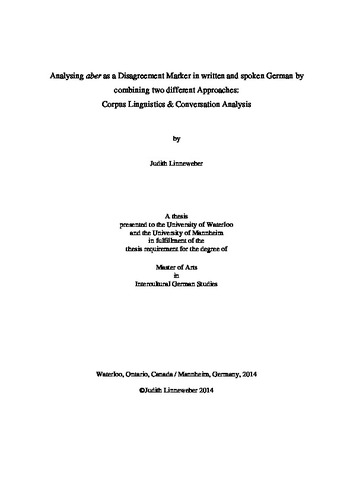| dc.contributor.author | Linneweber, Judith | |
| dc.date.accessioned | 2014-09-08 12:52:32 (GMT) | |
| dc.date.available | 2014-09-08 12:52:32 (GMT) | |
| dc.date.issued | 2014-09-08 | |
| dc.date.submitted | 2014 | |
| dc.identifier.uri | http://hdl.handle.net/10012/8773 | |
| dc.description.abstract | Working with the methodologies of conversation analysis and corpus linguistics, the main goal of this thesis is to determine different pragmatic functions of aber and to describe patterns that are used to perform disagreement in German. Based on the used data, written sources and naturally occurring data (audio and video tapes), I also reflected on the differences of what people think they do with language and what they actually do. Furthermore, in my conclusion I challenge whether the detected patterns are trouble sources in native non-native interactions.
My investigation showed that aber is used for negotiation processes and aims at ad-justing the interactants' perspectives or their level of knowledge. Arguing with aber, speakers try to strengthen their own position and weaken the recipient's opposite position. Here, differ-ent stable patterns reflect the gradual degree of the social problematicity of the aber-turn. The complex-construction type orients to a delicate action and contains hesitations, delays and re-starts. The aber is produced in combination with ja, the lexemes are pronounced separately. The combined-construction type is applied when the speaker performs a correction or tries to maintain a request. These turns contain a single aber or a ja aber, produced as one entity, and often a particle. The simple construction type is only applied when the positions are already established and a dissent turn is expected. The turns are produced with a single aber and no further hesitation marker. Difficulties for learners are opposition formats (Kotthoff 1991) and especially the use of particles, since their meaning is often context-sensitive, both elements are parts of disagreement turns with aber. | en |
| dc.language.iso | en | en |
| dc.publisher | University of Waterloo | en |
| dc.subject | disagreement | en |
| dc.subject | negotiation process | en |
| dc.subject | aber | en |
| dc.subject | native non-native interactions | en |
| dc.title | Analysing 'aber' as a Disagreement Marker in written and spoken German by combining two different Approaches: Corpus Linguistics & Conversation Analysis | en |
| dc.type | Master Thesis | en |
| dc.pending | false | |
| dc.subject.program | Intercultural German Studies | en |
| uws-etd.degree.department | Germanic and Slavic Studies | en |
| uws-etd.degree | Master of Arts | en |
| uws.typeOfResource | Text | en |
| uws.peerReviewStatus | Unreviewed | en |
| uws.scholarLevel | Graduate | en |

